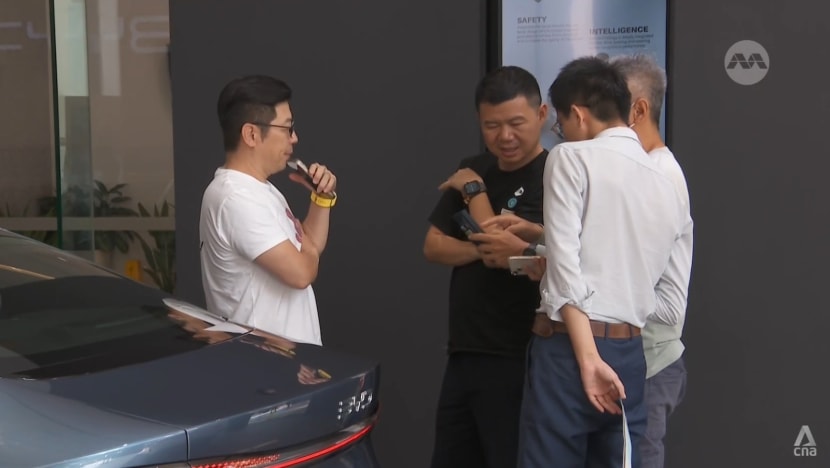Chinese EVs gain popularity as more brands and models reach Singapore shores
Vantage Automotive, which sells BYD, Ford and Peugeot cars, marked an increase in its electric vehicle sales from about 1,400 units the whole of last year, compared with more than 2,000 units so far this year.

BYD accounted for more than 40 per cent of newly registered electric vehicles in Singapore in the first half of this year.

This audio is generated by an AI tool.
SINGAPORE: Some market watchers expect Certificate of Entitlement (COE) premiums to rise in the short to medium term, driven by higher demand for electric vehicles - especially Chinese brands.
More Chinese EV brands are looking to enter the Singapore market, with a bigger range on offer.
For instance, BYD, which accounted for more than 40 per cent of newly registered electric vehicles in Singapore in the first half of this year, plans to bring in a luxury model later this year, said Mr Chan Cher Leong, director of aftersales at the firm’s Singapore office.
Other Chinese EV brands like Xpeng and Zeekr are also set to hit the market this year.
“(Singapore is) one of the fastest and largest growing (market at) this current stage … I believe that all the EV makers are actually rushing in to fill the gap,” said Mr Chan.
Some analysts expect the influx of such vehicles to rev up COE premiums.
Mr Say Kwee Neng, managing partner at EV business consultancy One Strategic Consulting LLC, said that with more car companies establishing sales offices here, their ability to compete on prices and COEs will improve.
“If you see their presence in the marketplace, it basically drives up competition for COEs. And when they do that, (COE) prices tend to creep up,” he said.
BETTER ACCEPTANCE OF EVs
The Chinese EV market’s growth here comes as more motorists accept these alternative cars, industry players said. It also comes amid a hike in EV import tariffs imposed by the European Union and the United States.
For instance, Vantage Automotive, which sells BYD, Ford and Peugeot cars, marked an increase in the sale of its EV cars - from about 1,400 units the whole of last year, compared with more than 2,000 units so far this year.
The firm’s managing director Anthony Teo said that among the reasons for the increasing acceptance are the government incentives available - they take up to S$15,000 (US$11,100) off new EVs.
“There is a general wrong perception that an EV is very expensive. But with the government incentive, in fact, the EV compared to an internal combustion engine vehicle, is quite comparable in pricing,” said Mr Teo.
To capture more of the market, brands, including BYD, have been introducing more Category A cars, or those 1,600cc and below with horsepower not exceeding 130bhp. These cars command smaller COE premiums.
Introducing more Category A EVs creates competition that could provide EV firms incentive to ensure that their models are priced reasonably to attract more buyers, Mr Teo said.
This could appeal to those holding out on such vehicles due to price, he added.
HIGHER EV DEMAND LIKELY IN FUTURE
Mr Chan believes that having more EVs on the road will attract even more of these vehicles.
“It's the ‘longest queue in the hawker centre syndrome kicking in’”, he said, referring to the Singaporean quirk of joining snaking queues at eateries with the assumption that the food would be good.
“Once the early adopters have put cars on the road, more Singaporeans sitting on the fence will start to be interested in them.”
He added that there will be “serious migration” from established Japanese brands to Chinese EV brands, as consumers look for more bang for their buck.
However, non-Chinese EV brands may not enjoy the perks of a growing market.
Komoco Motors, distributor of South Korea-made Hyundai vehicles, has yet to see an increase in EV sales.
The company pointed to rising inflation and low COE quotas as factors that make the landscape challenging, while noting that consumers are gravitating towards Chinese-made EVs for their low pricing.



















